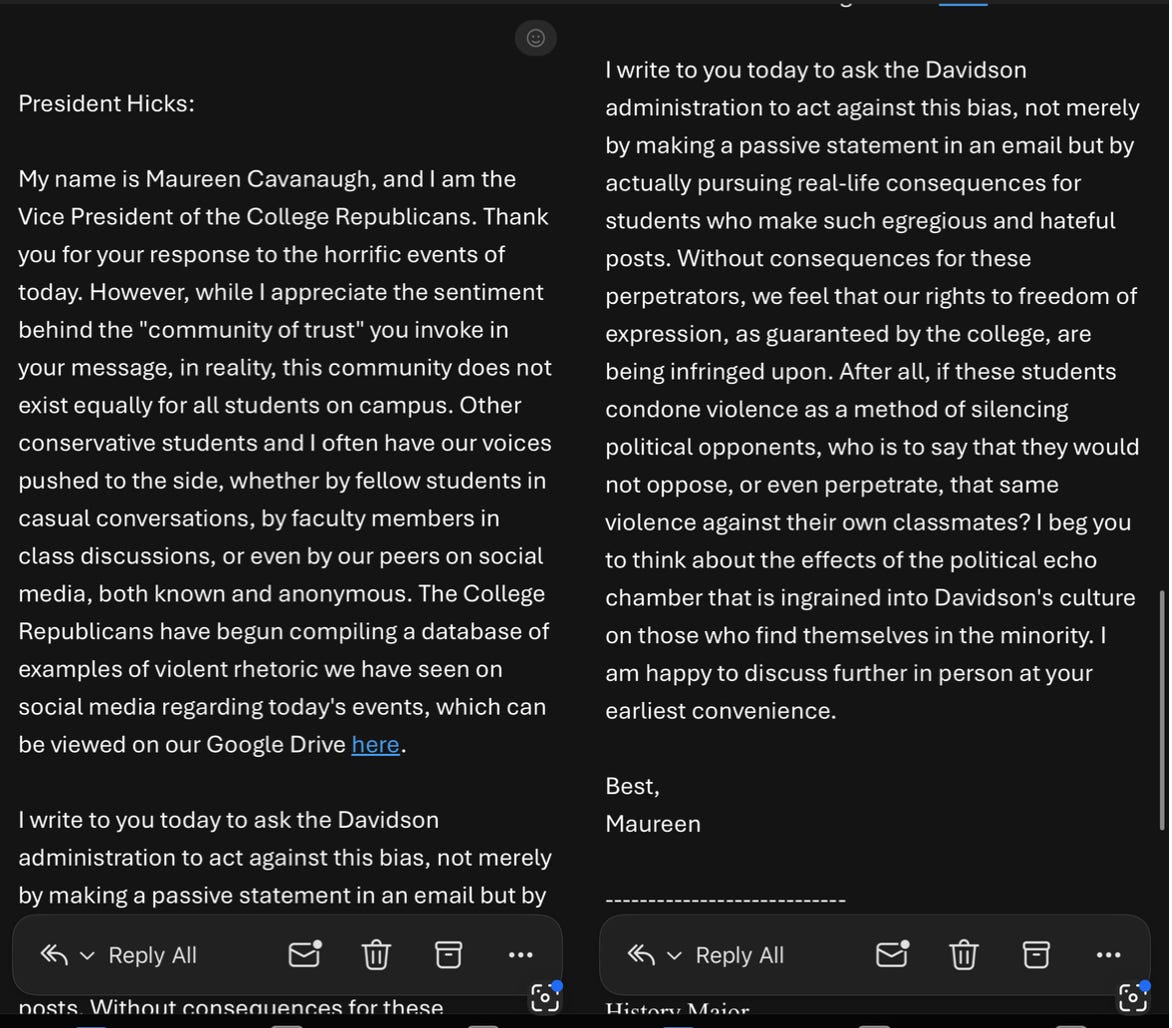When Free Speech Needs a Hall Monitor
Ethan Tran: Free speech tested in the wake of Charlie Kirk’s assassination
“Liberty is meaningless where the right to utter one’s thoughts and opinions has ceased to exist.” -Fredrick Douglass
A day after the assassination of Charlie Kirk, the Davidson College Republicans quickly organized a memorial to “remember and celebrate Charlie’s life and take a stand against the political violence that has engulfed our great nation.” That same day, the Davidson College Republicans filed a complaint with President Doug Hicks about students’ reactions to Kirk’s death. They submitted 94 screenshots of Davidson students’ YikYak and Instagram posts, which they described as “egregious and hateful” for condoning political violence.

They argued that such speech could ultimately endanger them, urging the administration to take disciplinary action against those students—framing their request as a defense of their own “rights to freedom of expression.”
As many others have pointed out, there’s no better way to insult a man than to contradict his convictions in his name. Endlessly, Kirk did exercise his first amendment rights—both to debate and associate himself with people he disagreed with. And now they try to defile that prerogative.
This complaint puts a painful stain on the Davidson College Republicans. Only last year, they condemned the administration for suppressing speech. Now, in the same breath, they demand the administration do exactly that on their behalf. They run to the administration to enact their ideals, and in doing so, surrender any title to free speech.
The Charges
Most of the screenshots they sent to the President were either apathetic over Charlie Kirk’s death or critical of his character. Only a small, nevertheless disturbing, minority actively celebrated his death. And only a single image actively encouraged more political assassinations, a statement that was thankfully so erroneous that it got downvoted into the negatives.
Based on the complaint, there are three possible charges that the Davidson College Republicans seemingly wants the college to pursue: hate speech, incitement, and threat.
Hate Speech: A Faux-Legalese
One can certainty classify those curated social media posts cited as hateful and ugly. It seems distasteful to insult a man not even a day after he was assassinated. Even more perniciously, to celebrate political violence undermines the very foundations of civil society. It would seem very easy to convince a good load of people that those comments are “hate speech.”
However, contrary to what Attorney General Pam Bondi seems to think, there is no legal distinction between hate speech and free speech—they are one and the same. After all, one man’s hate speech is another’s conviction.
My own disapproval of the posts is just that: a personal judgment of another’s conduct and thought. However convinced I am that such sentiments corrode society, I cannot call for their censorship. Even if the vast majority were to agree, there would still be no just cause to silence dissent, for it is precisely that kind of speech the First Amendment was designed to protect—“freedom for the thought we hate.”
The Law
Unlike hate speech, the complaint has potential for two legally unprotected classes of speech: incitement and threat. These two have been universally accepted as unprotected because their restriction is due to the external danger presented, not the content itself.
For speech to qualify as incitement, it must fulfill a strict standard where the speech incites “imminent lawless action and is likely to incite or produce such action.” To claim the curated social media posts satisfies this strict standard requires a great deal of mental gymnastics. None of the posts encouraged violence and many even went further in directly condemning the assassination. To determine that these posts will even have a chance of inciting Davidson students is an even more erroneous conclusion.
Legally, a threat is an expression of serious intent to harm someone. The Davidson College Republicans’ suggestion that they may be under serious threat is their most absurd argument. None of the cited posts directly threatened a person, much less another Davidson student. To construe those posts as such is not only a distortion of law, but an insult to our college and community.
Davidson’s Commitment
As a private institution, Davidson would normally not have to care for the first amendment. Most private colleges could just concede to the Davidson College Republican’s demands and sanction those students. But since Davidson committed itself to free speech, it cannot, by any circumstance, silence that right. To avoid breaking a legitimate contract, the college must stand for the first amendment.
On that standard, the posts at issue—however caustic—do not qualify as defamation, true threats, or unlawful harassment. Punishing them would blur the very lines the policy draws and would erode the College’s credibility. A community that prides itself on intellectual rigor and civic virtue ought to meet bad ideas with better arguments, not top-down administrative shortcuts.
This is the work of a liberal arts college: to let students test claims, challenge orthodoxy, and learn in public. Censorship is a poor teacher. It breeds resentment, especially among the young, and leads to more confusion. The answer to rhetoric that romanticizes violence, and I find that to be a rarity at Davidson, is not force imposed from a higher power, but argument, history, and moral clarity.
As our College President said after the assassination:
“A necessary element of addressing any and all social problems--including violence--is the free expression of ideas, mutual listening and respect, and the willingness to learn and act. College campuses must be a forum and an exemplar of open debate. This is a core part of our Davidson College community.”
The path forward is clear: enforce the policy’s narrow exceptions when speech breaks the law, but otherwise protect open expression. The real test is consistency—especially when the speech is unpopular.





Punsiehd for not crying: Thousands of North Koreans face labour camps for not being upset enough about death of Kim Jong-il. https://www.dailymail.co.uk/news/article-2085636/North-Koreans-face-labour-camps-upset-death-Kim-Jong-il.html